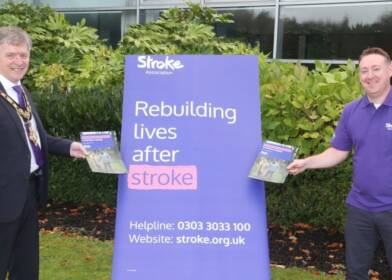Causeway Coast and Glens Borough Council is taking part in a campaign to mark World Stroke Day 2020 today (Thursday 29th October 2020).
Cloonavin will be illuminated in purple as a sign of support for people rebuilding their lives after stroke.
World Stroke Day aims to highlight the serious nature and high incidence of stroke globally, raise awareness of the prevention and treatment of the condition, and ensure better care and support for survivors.
The Mayor of Causeway Coast and Glens Borough Council Alderman Mark Fielding was recently presented with a copy of the Stroke Association’s new manifesto ‘Progressing Stroke Reform in Northern Ireland’, by Mark Dyer, the Stroke Association’s Volunteering and Community Manager.
It sets out the charity’s key asks of local government and highlights why urgent reform of stroke services is even more important now during the Covid-19 pandemic.
The Mayor said: “The Stroke Association is working hard to ensure that services including prevention, acute care and long-term support are given the prominence they require. With this in mind I was pleased to have this opportunity to accept the charity’s new manifesto and confirm Council’s support for an awareness raising campaign which will see Cloonavin illuminated in purple light on World Stroke Day.”
Barry Macaulay, Director of the Stroke Association in Northern Ireland, said: “I’d like to thank Alderman Mark Fielding for meeting with us and accepting a copy of our new Stroke Association manifesto. We’re delighted to see so many councils embracing the spirit of World Stroke Day 2020 and lighting up council buildings in purple.
We were very encouraged that at the beginning of 2020, the Northern Ireland Executive made a commitment to reconfigure hospital provision for stroke and make improvements in stroke care by the end of the year. They emphasised that doing so would deliver better patient outcomes, more stable services and more sustainable staffing in stroke care in Northern Ireland. However, we were very disappointed that the ’Rebuilding Health and Social Care Services Strategic Framework for Northern Ireland’, published in June 2020, stated that it was ‘unlikely that stroke reforms will progress by end of 2020’.
While we appreciate the challenges posed by the pandemic for the health and social care sector, the Covid-19 crisis should be seen as an opportunity to reform our health system. Change is long overdue and we must do better to improve outcomes for stroke survivors and their families, both now and in the future. Staying as we are is not an option and a lack of progress puts lives and recoveries at risk”.
There are 1.2 million stroke survivors living in the UK, that’s almost 39,000 people in Northern Ireland and over 100,000 strokes every year in the UK with 4,000 in NI, making stroke a leading cause of adult disability.
To find out more about the work of the Stroke Association go to www.stroke.org.uk/campaignsni.

